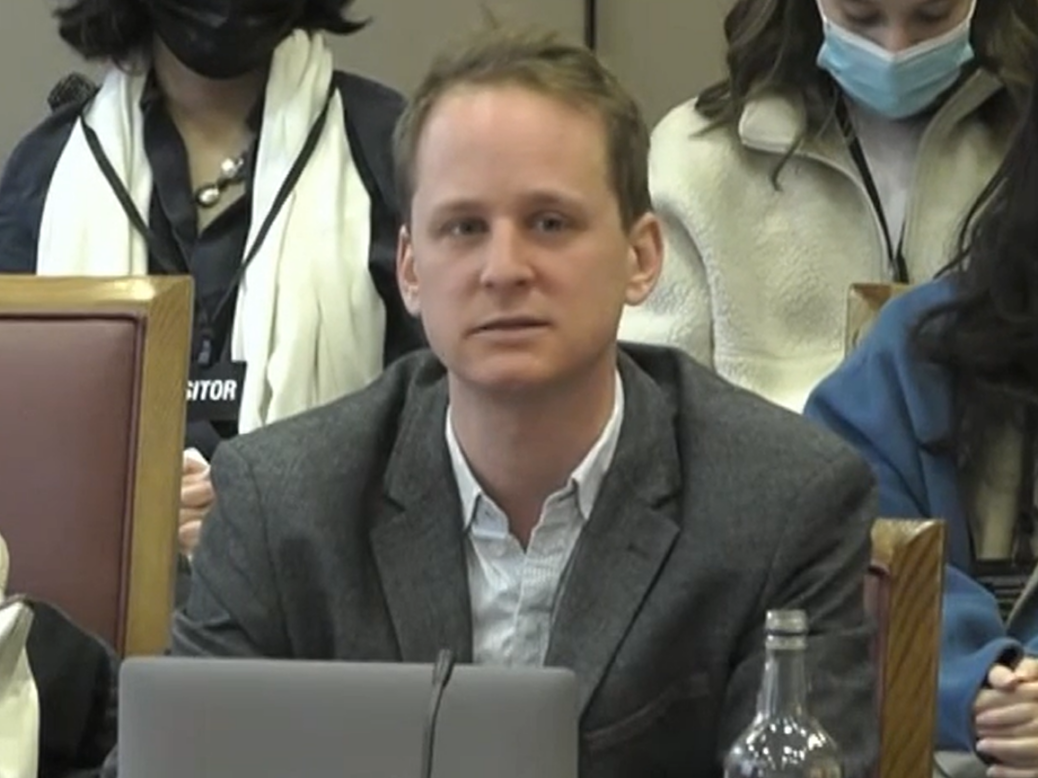
The impact of the wealthy using SLAPP cases to intimidate journalists is much worse in the UK than people realise with those that end up in court being “just the tip of the iceberg”, a House of Lords Committee has heard.
Journalists and lawyers providing evidence to the House of Lords Communications and Digital Committee on Thursday said the impact of SLAPP cases went deeper than court cases, with pre-court intimidation and the threat of costly legal proceedings meaning countless articles never get published.
Committee chair Baroness Tina Stowell said the evidence showed that the “SLAPP cases we do know about represent just the tip of the iceberg” and that they would now write to the Government to “encourage urgent action on this issue”.
SLAPP stands for Strategic Lawsuit Against Public Participation and is used to describe heavy-handed legal actions used by wealthy individuals or companies to intimidate and deter journalists.
Franz Wild (pictured), finance editor at The Bureau of Investigative Journalism, told the committee: “A couple of years ago, I was working on a story about a very wealthy and powerful individual who was under US sanctions. We were looking into whether this individual was circumventing those sanctions, so clearly something that is in the public interest.
“Two whistleblowers from the Democratic Republic of Congo came forward with a lot of information that somehow that person was making transactions worth tens of millions of dollars despite these sanctions.
“As we were preparing for publication, lawyers from Carter-Ruck approached us and what ensued was a flurry of very lengthy letters and they immediately turned the tables on us, accused us of dishonesty and tried to identify our sources… All of this was intended to undermine the reporting.”
He added: “The whole thing was a high-wire act. We started with an endeavour that we believed was in the public interest, but we soon realised that if we put one foot wrong we could end up in court. This is just a snapshot. Cases like this are very common in newsrooms across the UK.”
“It’s almost everywhere you look… And it’s often the same law firms that pop up again and again,” added Wild, citing the legal firms Harbottle & Lewis, Mishcon de Reya and Taylor Wessing. “It’s actually not about the trials, it’s about bringing to bear this incredible pressure pre-trial. There are these cases you never hear about because one side backs down.”
Committee member Lord Griffiths of Burry Port cited a 2020 survey of reporters across 41 countries that found the UK was the source of 31% of legal threats against journalists, almost as much as all EU countries (24%) and the United States (11%) combined.
The Guardian‘s director of editorial legal services Gill Phillips said: “Once it’s known that company X or oligarch Y is out there making threats, you think twice about it [publishing stories on them], if not three or four times.”
Phillips added: “There needs to be a quick process that takes something that’s identified as a SLAPP case out of the mainstream system and puts it into something where there are fixed costs, where there are no or low cost risks for people.”
The Government has set out plans to crack down on SLAPP cases, including capping the costs that claimants can recover to stop the high cost of litigation from being “weaponised” against free speech and the introduction of a requirement for claimants to prove “actual malice” in libel cases.
Committee chair Baroness Tina Stowell said after the hearing: “Today we heard concerning evidence that free speech is being chilled by the use of SLAPPs. We heard that the SLAPP cases we do know about represent just the tip of the iceberg because the claimants are successful in stifling investigative journalism and publishing.
“We heard that the costs and number of cases have become out of control. We also heard that the UK’s complex legal framework and costly processes make it an attractive place for powerful individuals to pursue SLAPP cases.
“We also heard about the unacceptable behaviour by certain legal firms and the need for more robust action from the SRA in light of these systemic practices. We will be writing to the Government to encourage urgent action on this issue.”
The committee heard from Harper Collins legal director Thomas Jarvis, who said the publisher regularly does not publish certain information in books in the UK that will be included in its US or international editions because “the risk of publication in the UK is far greater”.
A Kazakh mining giant’s case against Harper Collins and FT journalist Tom Burgis, who wrote Kleptopia: How Dirty Money is Conquering the World, was dismissed by a High Court judge last month, saving the publisher from a potential bill of more than £1m.
Not long before, Harper Collins and journalist Catherine Belton settled with several Russian oligarchs including Roman Abramovich who took issue with parts of her book Putin’s People.
Belton last month Belton told the Foreign Affairs Committee they had agreed to make “very small changes” to the book not because anything was wrong with her reporting, but “because we had too many cases to deal with”.
Picture: Parliamentlive.tv
Email pged@pressgazette.co.uk to point out mistakes, provide story tips or send in a letter for publication on our "Letters Page" blog
